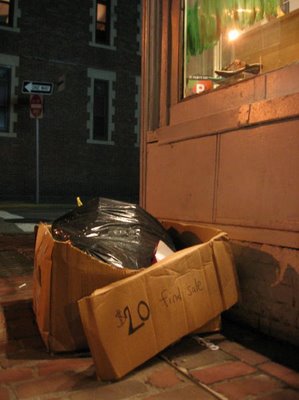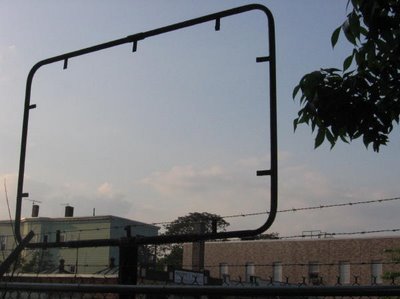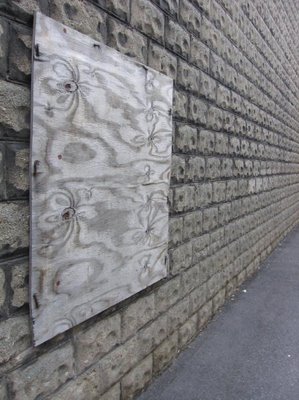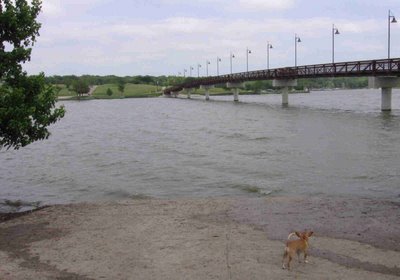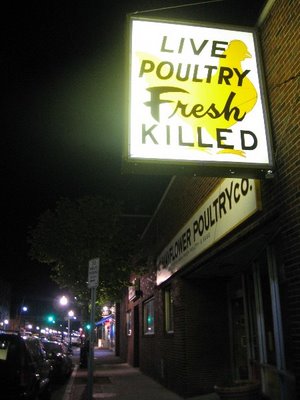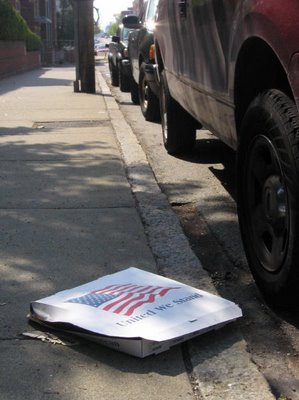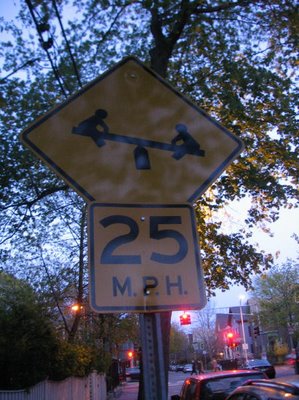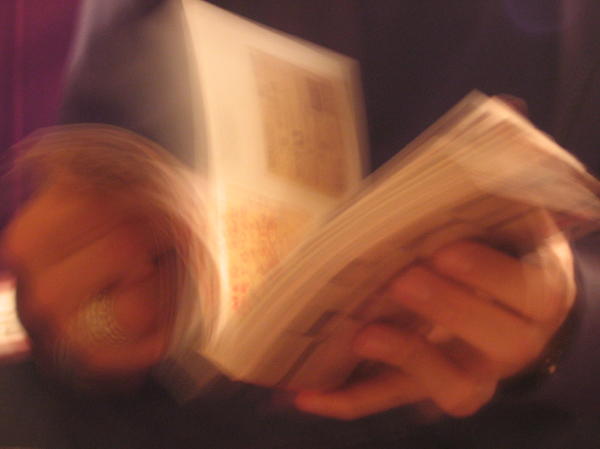Monday, May 29, 2006
but is it art, part one
Labels:
art styles,
beacon,
found art,
repetition,
somerville,
urbaniana,
walls,
wood
Monday, May 22, 2006
El Museo Dificil (part one)
For years I had avoided visiting the Difficult Museum, although everyone always insisted it was a must. The guidebooks never failed to mention it. It was always a top attraction for tourists, and every art and design school considered it a foundation of a well-rounded education. It was, everyone always told me, “immersive.”
Invasive was more like it. My freshman college roommate had gone to the museum over spring break, and soon after we resumed classes I noticed that his behavior had changed radically. Chad had been a shy, retiring guy when I first knew him. He rendered quick and elegant nudes in charcoal. He preferred soft watercolors to bolder paints. Everything about his art was gentle and subtle, if a little childishly surreal.
After a weekend trip to the Difficult Museum, however, he traded to acrylics, with an emphasis on reds, yellows, and black. The lithe, nubile coeds he used to flatter with his sketches were soon put off by the craggy deterioration that began to creep into his drawings. Chad’s wide, blue eyes narrowed into troubled slits. I didn’t know the guy anymore, and I made sure not to sign up for another year as his roommate.
The fact that his art career took off in just another year and that he was mounting major exhibitions by late junior year meant nothing, as far as I was concerned. The museum had done something to him, and I didn’t want that done to me.
It was the same with a couple of girlfriends of mine as well. Neither of them hit the same professional stride that Chad did, but they both altered their behavior and their art soon after visiting the place. Raquel was a sculptor who liked to work dark woods into organic, vaguely erotic shapes. She finished and polished them all to a high gloss, and those sculptures were one of the first things that attracted me to her. There was a purity in her expression, and only a mild, if potent, sexuality. The sculptures reminded me of Raquel herself: slender but rounded, oddly beautiful, slightly divine.
Then she went to the Difficult Museum to gain extra credit for one of her Shape and Form seminars. The next time we went out, she was sullen and avoided my eyes. She seemed obsessed with the notion of objectification. She told me more than once that I stared at her too much. I told her that I simply found her attractive. She said, exactly, and that it was something of a problem.
Soon after, she stopped seeing me. She stayed in touch, but she literally refused to allow me any visual contact with her. When I saw her across campus, she hurried away and often ducked into the women’s restroom until she was sure I’d left. The only time I was allowed to see her was at our student exhibitions, to which she began submitting large numbers of new, strange work.
She still preferred to work in wood, but only as a base. All manner of implements--nails, pipes, screws, glass shards, jagged pieces of rock--were worked into the sculptures. She gouged the wood, splintered it, broke pieces awkwardly, and removed any traces of smoothness or shine. Eventually she started dating someone else, and they left school together prior to graduation. At the last exhibit of hers that I saw, she had started hammering other bits of wood into her pieces, handcarved nails of hardwood that she drove into soft pine. She’d also taken up woodburning, with alarming, frankly vulgar results.
For these and other reasons, I had absolutely no desire ever to go to that damn museum. As far as I could see, all it did was make happy people miserable. The only people who appeared unaffected were miserable to begin with. So lots of my fellow art students seemed to pass through its doors with little aftereffect, though they all raved about it sullenly.
I did, however, have cause to wonder over the course of the next decade whether I had made the right choice in avoiding the Difficult Museum. I had completed my courses, developed my own sense of artistic expression, and founds some mild success with my wry, brightly colored canvases of invented cartoon characters. They made for good T-shirts, and I had a certain cache with disaffected hipsters burdened by expendable cash. But I was nowhere near the level of professional success Chad had achieved. His work had become collectible by people whose names appeared in the mastheads of international art journals. Raquel had a few pieces acquired by museums. And other colleagues were headlining shows that were getting breathless reviews by bigwig tastemakers.
Meanwhile, I had a few characters I’d managed to license to a skateboard manufacturer. My works tended to get shown as one facet of multiartist shows. I was doing okay, but my writeups were in magazines that tended to be printed on newsprint in black-and-white. Most of my fans wore flat-bottomed sneakers and baggy pants. They didn’t care that there was no place for my work in the museums, because they only went there with class field trips. I was impressing the same kinds of people who had attended parties with me in high school. I was getting older, but most of my audience wasn’t.
That’s when Juanda called. We’d been at school together, and she and I often displayed our work at some of the same shows. She’d been asked to track me down to see if I wanted to contribute some pieces to a special exhibit. It was to be a “flash retrospective,” a quick look back at the ten years since my particular class left my particular college. Without my knowing it, our class had achieved some status as a talent collective. And because I was still working and selling my work, I got lumped in with the rest of them, although the other names on the list were, as far as the art community was concerned, actual Names. My former roommate Chad was chief among them, of course.
Juanda said she’d been asked to select some works of her own for inclusion, and that the organizer of the exhibition wanted to find a few people who weren’t with the galleries he’d already contacted. Which was a nice way of indicating that we hadn’t really made it the way our other classmates had. But they probably wanted the exhibit to have some variety and flavor. That’s where my work would come in, on the end of the spectrum about which some viewers would declare, “I guess they’ll let just anybody be an artist these days.”
But it was exposure, and you could never tell what might come of such things. I’d select some pieces for the shallow end of the pool and hope for some good reviews. Maybe the luster of my more successful colleagues would add a bit of shine to my own stature. I asked Juanda who I should contact.
“Anton Fighorn,” she said, “the curator at the Difficult Museum.”
Invasive was more like it. My freshman college roommate had gone to the museum over spring break, and soon after we resumed classes I noticed that his behavior had changed radically. Chad had been a shy, retiring guy when I first knew him. He rendered quick and elegant nudes in charcoal. He preferred soft watercolors to bolder paints. Everything about his art was gentle and subtle, if a little childishly surreal.
After a weekend trip to the Difficult Museum, however, he traded to acrylics, with an emphasis on reds, yellows, and black. The lithe, nubile coeds he used to flatter with his sketches were soon put off by the craggy deterioration that began to creep into his drawings. Chad’s wide, blue eyes narrowed into troubled slits. I didn’t know the guy anymore, and I made sure not to sign up for another year as his roommate.
The fact that his art career took off in just another year and that he was mounting major exhibitions by late junior year meant nothing, as far as I was concerned. The museum had done something to him, and I didn’t want that done to me.
It was the same with a couple of girlfriends of mine as well. Neither of them hit the same professional stride that Chad did, but they both altered their behavior and their art soon after visiting the place. Raquel was a sculptor who liked to work dark woods into organic, vaguely erotic shapes. She finished and polished them all to a high gloss, and those sculptures were one of the first things that attracted me to her. There was a purity in her expression, and only a mild, if potent, sexuality. The sculptures reminded me of Raquel herself: slender but rounded, oddly beautiful, slightly divine.
Then she went to the Difficult Museum to gain extra credit for one of her Shape and Form seminars. The next time we went out, she was sullen and avoided my eyes. She seemed obsessed with the notion of objectification. She told me more than once that I stared at her too much. I told her that I simply found her attractive. She said, exactly, and that it was something of a problem.
Soon after, she stopped seeing me. She stayed in touch, but she literally refused to allow me any visual contact with her. When I saw her across campus, she hurried away and often ducked into the women’s restroom until she was sure I’d left. The only time I was allowed to see her was at our student exhibitions, to which she began submitting large numbers of new, strange work.
She still preferred to work in wood, but only as a base. All manner of implements--nails, pipes, screws, glass shards, jagged pieces of rock--were worked into the sculptures. She gouged the wood, splintered it, broke pieces awkwardly, and removed any traces of smoothness or shine. Eventually she started dating someone else, and they left school together prior to graduation. At the last exhibit of hers that I saw, she had started hammering other bits of wood into her pieces, handcarved nails of hardwood that she drove into soft pine. She’d also taken up woodburning, with alarming, frankly vulgar results.
For these and other reasons, I had absolutely no desire ever to go to that damn museum. As far as I could see, all it did was make happy people miserable. The only people who appeared unaffected were miserable to begin with. So lots of my fellow art students seemed to pass through its doors with little aftereffect, though they all raved about it sullenly.
I did, however, have cause to wonder over the course of the next decade whether I had made the right choice in avoiding the Difficult Museum. I had completed my courses, developed my own sense of artistic expression, and founds some mild success with my wry, brightly colored canvases of invented cartoon characters. They made for good T-shirts, and I had a certain cache with disaffected hipsters burdened by expendable cash. But I was nowhere near the level of professional success Chad had achieved. His work had become collectible by people whose names appeared in the mastheads of international art journals. Raquel had a few pieces acquired by museums. And other colleagues were headlining shows that were getting breathless reviews by bigwig tastemakers.
Meanwhile, I had a few characters I’d managed to license to a skateboard manufacturer. My works tended to get shown as one facet of multiartist shows. I was doing okay, but my writeups were in magazines that tended to be printed on newsprint in black-and-white. Most of my fans wore flat-bottomed sneakers and baggy pants. They didn’t care that there was no place for my work in the museums, because they only went there with class field trips. I was impressing the same kinds of people who had attended parties with me in high school. I was getting older, but most of my audience wasn’t.
That’s when Juanda called. We’d been at school together, and she and I often displayed our work at some of the same shows. She’d been asked to track me down to see if I wanted to contribute some pieces to a special exhibit. It was to be a “flash retrospective,” a quick look back at the ten years since my particular class left my particular college. Without my knowing it, our class had achieved some status as a talent collective. And because I was still working and selling my work, I got lumped in with the rest of them, although the other names on the list were, as far as the art community was concerned, actual Names. My former roommate Chad was chief among them, of course.
Juanda said she’d been asked to select some works of her own for inclusion, and that the organizer of the exhibition wanted to find a few people who weren’t with the galleries he’d already contacted. Which was a nice way of indicating that we hadn’t really made it the way our other classmates had. But they probably wanted the exhibit to have some variety and flavor. That’s where my work would come in, on the end of the spectrum about which some viewers would declare, “I guess they’ll let just anybody be an artist these days.”
But it was exposure, and you could never tell what might come of such things. I’d select some pieces for the shallow end of the pool and hope for some good reviews. Maybe the luster of my more successful colleagues would add a bit of shine to my own stature. I asked Juanda who I should contact.
“Anton Fighorn,” she said, “the curator at the Difficult Museum.”
Saturday, May 20, 2006
Monday, May 15, 2006
Sunday, May 14, 2006
Vincent Makes His Bold Move
As far as Vincent was concerned, there was a time and place for everything. He didn’t, unfortunately, know the times and the places as often as he would like. But he felt certain that both existed, and much of his thinking went toward identifying the right combination of both to achieve the things that mattered most to him.
He had known at once, therefore, that when Pancakes’s big-shot college boyfriend stood her up for the prom, she’d be unapproachable for a while. But he couldn’t have predicted the months-long length of her general disaffection for males in general, which even included her father and himself at times. And while he had known also that once he took Pastina's sister, Francesca, to the prom that Pastina would withhold her customary friendly sympathy for at least a month, he miscalculated how much longer she would try shaming him with the incident.
Most surprising, really, had been Francesca’s frank sexual overtures at the prom party several of her friends had organized in a hotel suite. Nothing in their acquaintance could have prepared him for that. She was his friend's little sister, after all. But it was almost a year before Fran stopped calling him a “wuss” for the way he fled the suite to escape her embrace that night.
A better assessment of times and places could have smoothed out all such incidents, he was sure. However, while his predictive abilities improved incrementally, the behavior of his friends grew ever more unruly.
One thing he felt certain he could always predict, however, was Pancakes’s unfailing interpretation of symbolism. In such matters, time and place made little difference. Sometimes she read too much into things, but if ever he knew someone certain to extract meaning from most everything, it was Pancakes. She saw significance in some of the slightest events, and she frequently astonished him with the clear-eyed way she sized up the books and movies they discussed. So he knew if he could make the right kind of symbolic gesture to demonstrate how he felt about her, she would never miss what he meant by it. The only questions then were the selection of the symbol and the determination of the time and place.
If he had been on regular speaking terms with Pastina, she would have told him not to think so hard about it. If he somehow could have consulted Pancakes about it, she would have asked him what he hoped to gain by an overt symbolic gesture. If Francesca had been willing to listen to Vincent’s concerns, she would have called him a wuss again and insisted, “If you like her like that, just grab her and kiss her. That’ll settle it one way or another.”
In the end Vincent decided to seek no one’s counsel. He could figure this out on his own. If he was willing to face how he felt about Pancakes, he could at least figure out how he should express those feelings. Probably.
And so he found himself at the end of that summer still mulling over the same questions. Pancakes’s period of aggression and alienation from the opposite sex had been something of a rollercoaster ride for anyone willing to get too near. She poured out pages of words on some new project, another play that seemed to be obsessing her all of a sudden. She dated a series of throwaway guys throughout the summer months, allowing herself to be pursued for a period, dating contentedly for a week or so, and then dismissing the guy in question with no warning or explanation. And in between she took strange pleasure in needling her bewildered father about his own romantic missteps. Her victim might have been her father, but her theme was specifically about the fickleness of the male heart. She never referred specifically to the numerous short-term boyfriends she'd had over the years. In her mind they were all the same guy. All of them shared in the guilt. Vincent knew that was in her mind, and so he delayed his plan from one week to the next, hoping for some break in which Pancakes might not see him as just another treacherous man.
Then came mid-August. It had been two weeks since Pancakes had cut loose another of her summer flings. It had been days since Pancakes had uttered his name editorially, putting undue emphasis on the first syllable (“Vincent”). And just a few days earlier, she had handed Vincent a wrinkled clutch of papers that contained scenes from her new play. Vincent knew he was back in the circle, and he knew that if there existed a right time, it was upon him. If there existed a right place, he would need to find it quickly. When he found himself sitting just a few feet from Pancakes in a public park at night, he figured both things had finally come into alignment.
A group of their friends had gathered that night, as they had many nights over that summer, to uncork a few bottles of wine and sip it from plastic cups. A stream ran along one side of the park, but the bugs were worse in that area, so they usually ended up sitting together on a set of low risers adjacent to a soccer field. Pancakes had brought five different boyfriends to that park throughout June, July, and August, but in the end the only males in attendance were Pastina’s current beau, Vincent, and Vincent’s longtime, still usually silent friend Lee. Vincent had been happy to witness Pancakes settling near him on the risers, and he felt the pressure of the moment upon him. He reached into the pocket of his battered denim jacket and felt the firm double teardrop shape of the quartz crystal heart he’d been carrying there for over a month.
Pancakes had been holding forth for several minutes on the specifics of her new play. “It’s basically the story of a trade-off,” she said. “The main character is this linguist who’s been helping to decrypt an old scroll. Ancient. Kinda Biblical, but that’s not for sure. But as he gets more into it and it gets more attention from all kinds of unexpected sources, he starts to realize that it has some kind of power if it can be translated. Or, anyway, that’s what everyone seems to think.” Vincent closed his eyes and enjoyed the sound of her voice. It had been a long time since he had heard pure excitement from her.
“Sounds like an adventure,” Pastina’s boyfriend said, and Pastina was glad he couldn’t see the pained expression on her face in the dark. Why did he have to be so simple in front of other people? “Could be more of a movie than a play. All you need is a love interest.”
“Ah!” Pancakes said. “But I have one. That’s the trade-off. A woman he falls in love with. A woman who ends up needing him to abandon his work. He could be in on something totally groundbreaking, a revelation of the old-school kind. So does he pursue that, or does he walk away from it in the hopes that helping out his love will be worth the loss?”
No one said anything for a moment. The sound of crickets filled the silence. Pancakes had still not abandoned her favorite topic of her parents' complicated dynamics, and even Pastina's boyfriend could see it.
But Pancakes couldn't, and Vincent didn't care as he listened to her description of her newest play. He took a deep breath and pulled the heart from his pocket. He held it tightly in his fist for a moment, then turned it over in his hands. It felt much heavier than its size would suggest.
“So?” Lee said finally. "What happens?" Most everyone had forgotten he was there, and his unexpected question made Vincent nervous again. He slipped the heart back into his pocket.
“Well, you have to come see the play, don’t you?” Pancakes said.
That started a sudden debate from everyone. Pancakes had teased them with the plot, then refused to follow through. The eruption of banter eased Vincent’s mind again, and he knew he would have to do this tonight or not do it at all.
What’s the worst that could happen? He knew she’d understand his gesture, and he knew that she would remain his friend even if she didn’t feel the same way. Probably she would. If only there were some way to be sure. But that was part of the point, wasn’t it? Would there be any reason to go through with it if he knew the outcome? If she would say yes for sure, would he even want her the same way? He held his breath and reached to get the heart again. It was now or never.
And suddenly it was . . . gone. The heart was gone! Vincent knew he must be wrong. He dug deep into his pocket, finding only lint and an oxidized paperclip. He reached into the opposite pocket, but there he found only a pencil stub and some change. Maybe he’d put it in one of his other pockets? He started feeling around everywhere, patting down all his pockets and touching lightly around the riser in the immediate area. Maybe it was somewhere nearby. Unless it fell, in which case . . .
“What are you doing?” Pancakes asked suddenly, and Vincent realized she was talking to him. “Did you lose something? Or do you have an itch or something?” Vincent realized he must have seemed more frantic than he realized.
“I, uh, yeah,” he said. “I dropped something, I think.”
“I hope it didn’t fall,” Pastina said. “It might be hard to find it under the risers. Was it important?”
“No, I guess not,” Vincent said. In his mind he was sketching diagrams of the trajectory such an object might take from that height. Maybe it would just fall straight down? Would it bounce or roll? And how far? Maybe he could still salvage it. “Lee, would you help me for a second? It’s just that it was a pen that I really like. Let’s just go down and look really quick.” Lee stood up and prepared to follow him.
“You want us to help you look?” Pancakes asked, starting to rise.
“No, that’s fine,” Vincent said. “If it’s down there, we’ll find it.” He started down and Lee followed after him.
“And if you don’t find it, we’ll go get you another one tomorrow,” Pancakes said.
“We’ll find it,” Vincent said. On the way down he had to confide in Lee what he’d actually lost, and each of the boys worked out a search pattern to cover the most likely places the heart could have fallen, bounced, or rolled. They paced off a large area, then walked in regular concentric patterns to cover as much of the space as possible. They sometimes got down on hands and knees to feel around the ground, especially near portions of the riser structure that might have stopped the roll of such and object. Lee fetched a flashlight from his car, and they panned around the most likely places.
They looked everywhere that the thing might logically have gone, and then they looked in some places that it seemed possible but rather unlikely that it might have gone. Finally, desperate and tired, Vincent started looking in some places that the heart could very likely have never gone. Eventually the rest of the party became restless and insisted Vincent call off the search. How much could a pen be worth, anyway?
Finally he gave up, and even though he returned to the park early the next day, he never did find the stupid thing again.
He had known at once, therefore, that when Pancakes’s big-shot college boyfriend stood her up for the prom, she’d be unapproachable for a while. But he couldn’t have predicted the months-long length of her general disaffection for males in general, which even included her father and himself at times. And while he had known also that once he took Pastina's sister, Francesca, to the prom that Pastina would withhold her customary friendly sympathy for at least a month, he miscalculated how much longer she would try shaming him with the incident.
Most surprising, really, had been Francesca’s frank sexual overtures at the prom party several of her friends had organized in a hotel suite. Nothing in their acquaintance could have prepared him for that. She was his friend's little sister, after all. But it was almost a year before Fran stopped calling him a “wuss” for the way he fled the suite to escape her embrace that night.
A better assessment of times and places could have smoothed out all such incidents, he was sure. However, while his predictive abilities improved incrementally, the behavior of his friends grew ever more unruly.
One thing he felt certain he could always predict, however, was Pancakes’s unfailing interpretation of symbolism. In such matters, time and place made little difference. Sometimes she read too much into things, but if ever he knew someone certain to extract meaning from most everything, it was Pancakes. She saw significance in some of the slightest events, and she frequently astonished him with the clear-eyed way she sized up the books and movies they discussed. So he knew if he could make the right kind of symbolic gesture to demonstrate how he felt about her, she would never miss what he meant by it. The only questions then were the selection of the symbol and the determination of the time and place.
If he had been on regular speaking terms with Pastina, she would have told him not to think so hard about it. If he somehow could have consulted Pancakes about it, she would have asked him what he hoped to gain by an overt symbolic gesture. If Francesca had been willing to listen to Vincent’s concerns, she would have called him a wuss again and insisted, “If you like her like that, just grab her and kiss her. That’ll settle it one way or another.”
In the end Vincent decided to seek no one’s counsel. He could figure this out on his own. If he was willing to face how he felt about Pancakes, he could at least figure out how he should express those feelings. Probably.
And so he found himself at the end of that summer still mulling over the same questions. Pancakes’s period of aggression and alienation from the opposite sex had been something of a rollercoaster ride for anyone willing to get too near. She poured out pages of words on some new project, another play that seemed to be obsessing her all of a sudden. She dated a series of throwaway guys throughout the summer months, allowing herself to be pursued for a period, dating contentedly for a week or so, and then dismissing the guy in question with no warning or explanation. And in between she took strange pleasure in needling her bewildered father about his own romantic missteps. Her victim might have been her father, but her theme was specifically about the fickleness of the male heart. She never referred specifically to the numerous short-term boyfriends she'd had over the years. In her mind they were all the same guy. All of them shared in the guilt. Vincent knew that was in her mind, and so he delayed his plan from one week to the next, hoping for some break in which Pancakes might not see him as just another treacherous man.
Then came mid-August. It had been two weeks since Pancakes had cut loose another of her summer flings. It had been days since Pancakes had uttered his name editorially, putting undue emphasis on the first syllable (“Vincent”). And just a few days earlier, she had handed Vincent a wrinkled clutch of papers that contained scenes from her new play. Vincent knew he was back in the circle, and he knew that if there existed a right time, it was upon him. If there existed a right place, he would need to find it quickly. When he found himself sitting just a few feet from Pancakes in a public park at night, he figured both things had finally come into alignment.
A group of their friends had gathered that night, as they had many nights over that summer, to uncork a few bottles of wine and sip it from plastic cups. A stream ran along one side of the park, but the bugs were worse in that area, so they usually ended up sitting together on a set of low risers adjacent to a soccer field. Pancakes had brought five different boyfriends to that park throughout June, July, and August, but in the end the only males in attendance were Pastina’s current beau, Vincent, and Vincent’s longtime, still usually silent friend Lee. Vincent had been happy to witness Pancakes settling near him on the risers, and he felt the pressure of the moment upon him. He reached into the pocket of his battered denim jacket and felt the firm double teardrop shape of the quartz crystal heart he’d been carrying there for over a month.
Pancakes had been holding forth for several minutes on the specifics of her new play. “It’s basically the story of a trade-off,” she said. “The main character is this linguist who’s been helping to decrypt an old scroll. Ancient. Kinda Biblical, but that’s not for sure. But as he gets more into it and it gets more attention from all kinds of unexpected sources, he starts to realize that it has some kind of power if it can be translated. Or, anyway, that’s what everyone seems to think.” Vincent closed his eyes and enjoyed the sound of her voice. It had been a long time since he had heard pure excitement from her.
“Sounds like an adventure,” Pastina’s boyfriend said, and Pastina was glad he couldn’t see the pained expression on her face in the dark. Why did he have to be so simple in front of other people? “Could be more of a movie than a play. All you need is a love interest.”
“Ah!” Pancakes said. “But I have one. That’s the trade-off. A woman he falls in love with. A woman who ends up needing him to abandon his work. He could be in on something totally groundbreaking, a revelation of the old-school kind. So does he pursue that, or does he walk away from it in the hopes that helping out his love will be worth the loss?”
No one said anything for a moment. The sound of crickets filled the silence. Pancakes had still not abandoned her favorite topic of her parents' complicated dynamics, and even Pastina's boyfriend could see it.
But Pancakes couldn't, and Vincent didn't care as he listened to her description of her newest play. He took a deep breath and pulled the heart from his pocket. He held it tightly in his fist for a moment, then turned it over in his hands. It felt much heavier than its size would suggest.
“So?” Lee said finally. "What happens?" Most everyone had forgotten he was there, and his unexpected question made Vincent nervous again. He slipped the heart back into his pocket.
“Well, you have to come see the play, don’t you?” Pancakes said.
That started a sudden debate from everyone. Pancakes had teased them with the plot, then refused to follow through. The eruption of banter eased Vincent’s mind again, and he knew he would have to do this tonight or not do it at all.
What’s the worst that could happen? He knew she’d understand his gesture, and he knew that she would remain his friend even if she didn’t feel the same way. Probably she would. If only there were some way to be sure. But that was part of the point, wasn’t it? Would there be any reason to go through with it if he knew the outcome? If she would say yes for sure, would he even want her the same way? He held his breath and reached to get the heart again. It was now or never.
And suddenly it was . . . gone. The heart was gone! Vincent knew he must be wrong. He dug deep into his pocket, finding only lint and an oxidized paperclip. He reached into the opposite pocket, but there he found only a pencil stub and some change. Maybe he’d put it in one of his other pockets? He started feeling around everywhere, patting down all his pockets and touching lightly around the riser in the immediate area. Maybe it was somewhere nearby. Unless it fell, in which case . . .
“What are you doing?” Pancakes asked suddenly, and Vincent realized she was talking to him. “Did you lose something? Or do you have an itch or something?” Vincent realized he must have seemed more frantic than he realized.
“I, uh, yeah,” he said. “I dropped something, I think.”
“I hope it didn’t fall,” Pastina said. “It might be hard to find it under the risers. Was it important?”
“No, I guess not,” Vincent said. In his mind he was sketching diagrams of the trajectory such an object might take from that height. Maybe it would just fall straight down? Would it bounce or roll? And how far? Maybe he could still salvage it. “Lee, would you help me for a second? It’s just that it was a pen that I really like. Let’s just go down and look really quick.” Lee stood up and prepared to follow him.
“You want us to help you look?” Pancakes asked, starting to rise.
“No, that’s fine,” Vincent said. “If it’s down there, we’ll find it.” He started down and Lee followed after him.
“And if you don’t find it, we’ll go get you another one tomorrow,” Pancakes said.
“We’ll find it,” Vincent said. On the way down he had to confide in Lee what he’d actually lost, and each of the boys worked out a search pattern to cover the most likely places the heart could have fallen, bounced, or rolled. They paced off a large area, then walked in regular concentric patterns to cover as much of the space as possible. They sometimes got down on hands and knees to feel around the ground, especially near portions of the riser structure that might have stopped the roll of such and object. Lee fetched a flashlight from his car, and they panned around the most likely places.
They looked everywhere that the thing might logically have gone, and then they looked in some places that it seemed possible but rather unlikely that it might have gone. Finally, desperate and tired, Vincent started looking in some places that the heart could very likely have never gone. Eventually the rest of the party became restless and insisted Vincent call off the search. How much could a pen be worth, anyway?
Finally he gave up, and even though he returned to the park early the next day, he never did find the stupid thing again.
Saturday, May 13, 2006
Tuesday, May 09, 2006
Monday, May 08, 2006
Friday, May 05, 2006
american pie
Labels:
beacon,
food,
kirkland,
patriotism,
pizza,
restaurants,
signs,
somerville,
symbolism
Tuesday, May 02, 2006
Subscribe to:
Comments (Atom)
